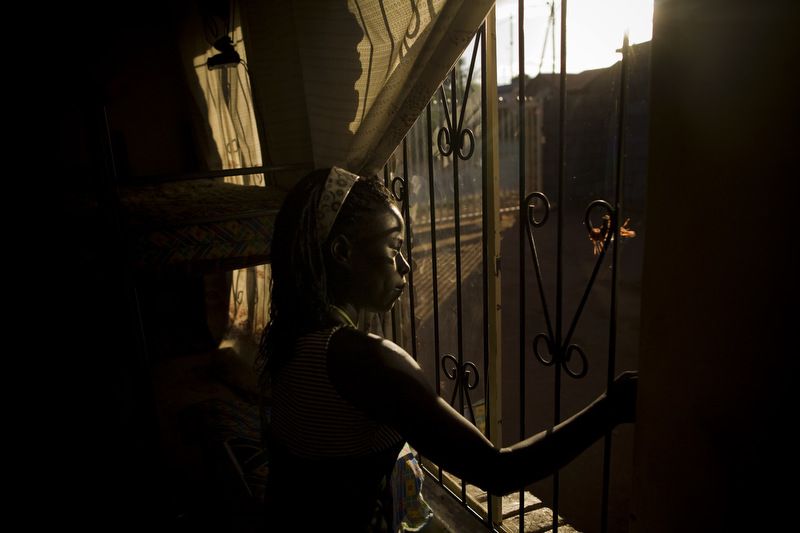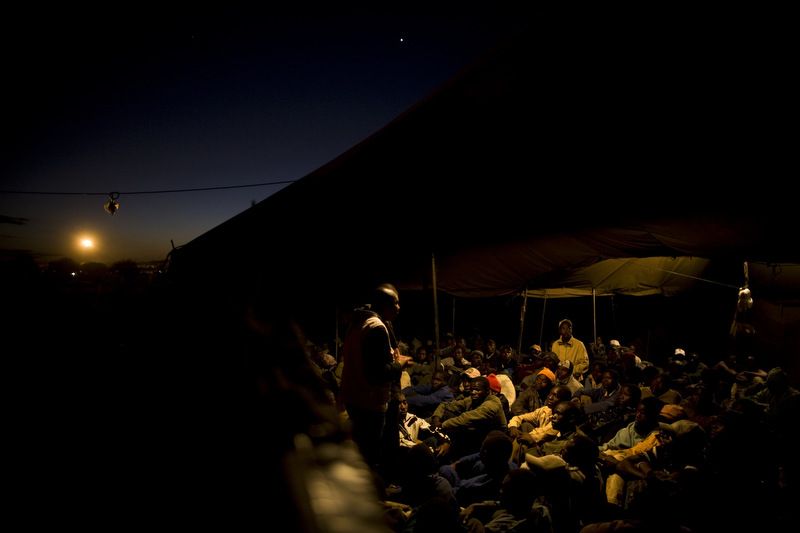A group of girls from the Musina rape survivors' shelter are clustered in the courtyard, giggling and smiling in the soft late afternoon sunshine. They had been singing and dancing just a moment ago in a game of out-doing one another, but everything changed once I brought out my microphone. Some of the girls suddenly became shy, hiding behind the shelter guardian Magogo's long skirts.
Nyasha, 13, couldn't be more excited. We nickname her "bouncy girl" because she bursts at the seams with energy, clapping and fidgeting, her voice crackling at the high notes. "English, English," she insists, and the girls settle on a church hymn:
"If I'm going to sing I'll sing alone."
Josephine, aged 15, stands in front of the microphone asserting her authority. She's serious about her singing, she tells me, and wants to do it professionally some day. "I'll sing alone, I don't want to sing with them," she repeats. She loves American-style R&B and hip-hop and breezes through a few verses of a fast song called Love Like This. "It's a love song, don't worry," she says. She calls over her friend Caroline, 17, and they sing a song together. "Sometimes?" asks Caroline. "Yeah," says Josephine. "You go first."
Caroline & Josephine - Sometimes
This one is much heavier than the others and everyone is quiet while they sing. I ask, did they write the song themselves? They nod yes. Caroline and Josephine are shy when it comes to the details of their crossing and their lives in South Africa, but the stories spill out in song—being abandoned or abused by their parents, struggling to make a new life alone in South Africa, and is the case with many of the girls and women who pass through this shelter, rape. Caroline's sister tells me later how, when a woman came to hire her as a domestic in a nearby town, she was assaulted and raped by her employers. The scars are still visible on her face. Caroline looks down when I talk to her and does not smile.
It's twilight and they cram together for a speech by someone from the Musina Legal Advice, cross-legged, skinny knees to their skinny chests, and quiet. "South Africa is very good," he says. "You are very welcome here. Whatever your reason for being here, I hope you fulfill it."
After the Musina Legal Advice lawyer is finished explaining the process of applying for asylum, it is time for church. The men shuffle to their feet, and for a few moments, glorious song fills their tent:
Musina Men's Shelter - Church Song
Many of them carry the same haunted expressions as Caroline and the other girls—they've been raped or beaten too.
Terriro, 21, has just arrived at the men's camp and he's nervous, his body hunched over, hands pressed tightly together between his thin sleeves. Through an interpreter his story comes together: He crossed into South Africa through the bush with his younger brother and paid the guma-guma, gangsters who patrol the Zimbabwean side of the border, 6 Rand (less than $1) to be transported safely. Instead they kidnapped him to a house where he was assaulted and raped by an older female guma-guma. Somewhere along the way he lost his younger brother. His mother is dead. His father, an activist in the opposition MDC party in Zimbabwe, was threatened that his grave would be dug in time for next year's elections. "The only option," says the interpreter, "is for you to run away."



